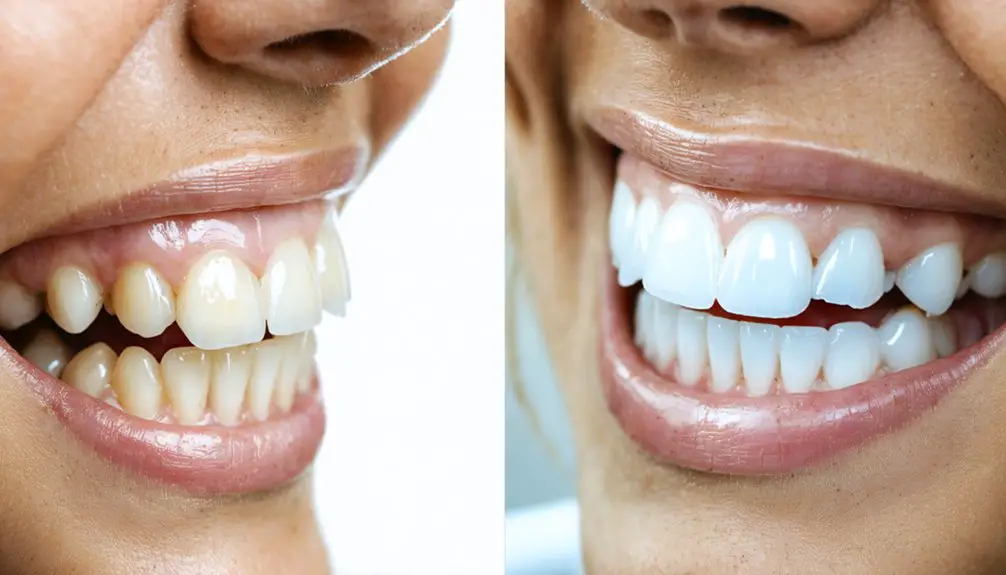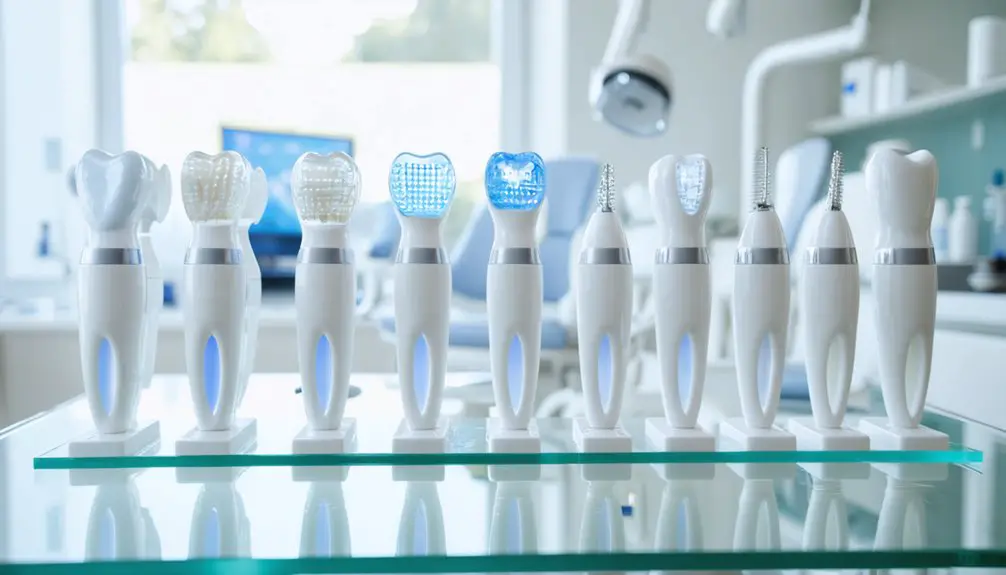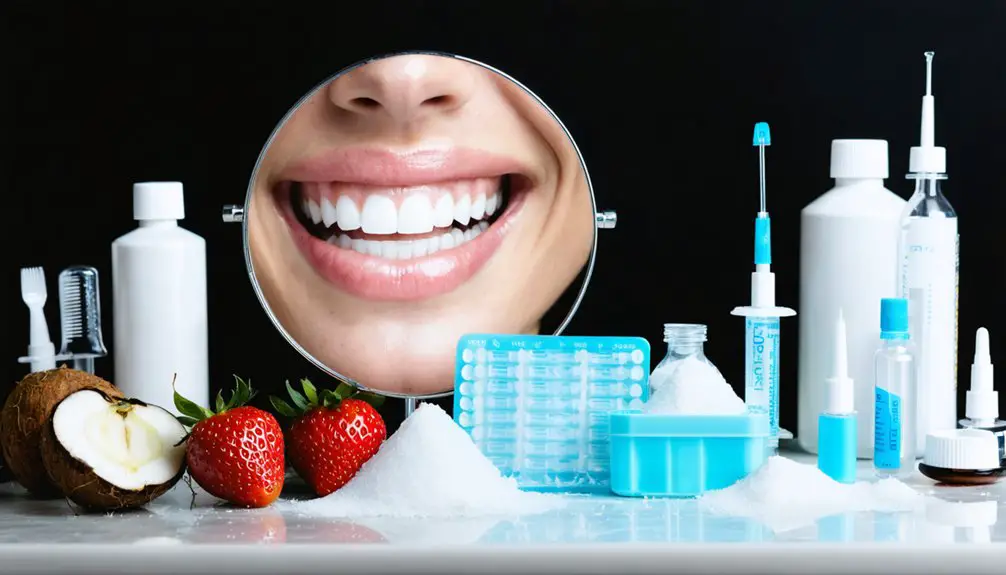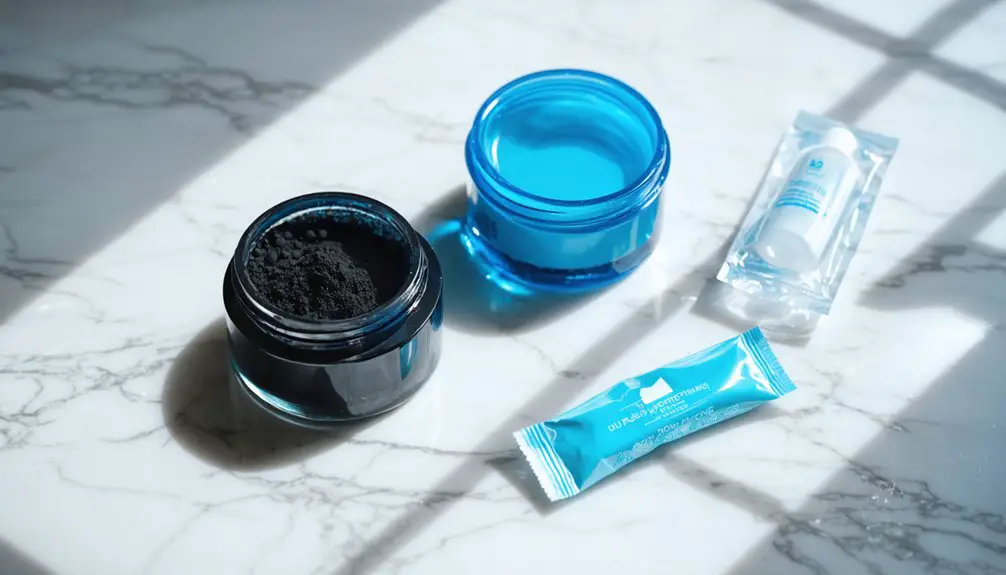You’ll find professional teeth whitening costs range from $300 to over $1,300, with several options to maximize your investment. In-office laser treatments ($611-$1,368) deliver fastest results, while dentist-prescribed take-home kits ($375-$500) offer a budget-friendly middle ground. Your location, chosen method, and provider’s expertise will impact pricing. To stretch your whitening dollars further, consider flexible payment plans, seasonal promotions, and bundled services – smart strategies await.
Key Takeaways
- Professional in-office treatments cost $300-$1,300 but deliver faster, more dramatic results compared to over-the-counter alternatives ($20-$100).
- Custom take-home whitening kits ($375-$500) offer excellent value by combining professional-grade materials with convenient at-home application.
- Bundling whitening treatments with regular dental check-ups and utilizing membership benefits can significantly reduce overall costs.
- Urban locations typically charge higher rates, so considering treatment in suburban areas may provide substantial savings.
- Proper maintenance and lifestyle choices extend treatment longevity, reducing the frequency of touch-ups and long-term expenses.
Understanding Professional Teeth Whitening Price Ranges
Three distinct price tiers define the professional teeth whitening landscape, with costs ranging from $300 to over $1,300 depending on your chosen method. Understanding these price trends helps you make informed decisions for your patients’ needs and budgets.
At the premium level, laser treatments deliver fastest results at $611-$1,368, while traditional in-office procedures cost $300-$1,000. A free consultation with a dental professional can help determine the most suitable whitening option.
Premium laser whitening offers rapid results at $611-$1,368, proving costlier than standard in-office treatments ranging from $300-$1,000.
For a mid-range option, dentist-prescribed take-home kits offer professional-grade results at $375-$500. Over-the-counter products provide the most economical solution at $20-$100, though they require longer treatment times.
Your location notably impacts teeth whitening costs, with urban areas typically commanding higher prices. Professional whitening can lighten teeth by up to eight shade levels, delivering more dramatic results than store-bought alternatives.
When evaluating options, consider that professional treatments often justify their higher costs through superior results and reduced sensitivity risks.
Breaking Down Treatment Cost Components
Professional teeth whitening costs break down into five key components that directly influence your total investment: the treatment method selected, provider expertise, technology and materials used, preparation services, and maintenance requirements.
Your treatment materials and consultation fees will vary considerably based on your chosen approach. In-office procedures using advanced technology can range from $500-$1,500, while take-home options cost $300-$600.
Provider location and expertise impact pricing, with urban practitioners typically charging premium rates. Results can last up to eight shades brighter with professional whitening treatments. You’ll need to factor in initial consultations, potential pre-treatment cleanings ($75-$200), and ongoing maintenance costs. Many dental offices provide financing plans to help manage treatment costs.
Consider that while professional treatments cost more upfront than over-the-counter options, they deliver superior, longer-lasting results that can provide better value over time.
Comparing Value Across Whitening Methods
When evaluating teeth whitening options, your investment should align with your desired outcomes and lifestyle needs.
LED effectiveness offers moderate results at a lower price point, requiring weekly maintenance for sustained brightness. The latest systems feature adjustable wavelengths to accommodate varying sensitivity levels.
Laser convenience delivers immediate transformation in a single session, though it’s typically more expensive than other methods. Professional treatments can achieve up to 8 shades of improvement in just one visit.
Consider tray benefits if you’re seeking a balance between professional results and cost-effectiveness, as custom-fitted options provide reliable whitening at home.
For those dealing with severe discoloration, veneer longevity might offer the best long-term value despite higher upfront costs.
While professional in-office treatments command premium pricing, they deliver faster, more dramatic results than at-home alternatives.
Your choice should weigh immediate costs against long-term maintenance requirements and the professional time investment needed for each method.
Key Factors That Impact Your Whitening Investment
Several critical variables influence the final cost of your teeth whitening investment. Your geographic location greatly impacts pricing, with metropolitan areas commanding higher rates than rural practices. Initial teeth whitening consultations with your dentist are essential to create personalized treatment plans.
The dentist’s expertise and reputation directly affect both whitening safety and treatment effectiveness, potentially justifying premium fees through superior results. Your teeth’s initial condition determines the number of sessions needed, while severe staining or dental issues may require additional treatments before whitening can begin.
The intensity and type of whitening method—whether in-office professional treatments ($500-$1,500) or take-home kits ($100-$600)—also shapes your total investment. Many dental offices provide flexible payment plans to help patients manage treatment costs.
Remember that ongoing maintenance costs contribute to long-term value, making it essential to evaluate both immediate and future expenses when planning your whitening treatment.
Strategies for Long-Term Cost Management
Managing the long-term costs of teeth whitening requires a strategic approach that balances initial investments with ongoing maintenance expenses.
You’ll maximize value by leveraging membership benefits, which often include significant discounts on both initial treatments and touch-up sessions. Some dentists offer free whitening annually through their membership plans. Consider timing your appointments during off-peak hours or seasonal promotions to secure better rates.
For sustainable cost management, explore professional at-home whitening kits with custom-fitted trays. They’re more affordable than in-office procedures and provide lasting results when properly maintained. Geographic location pricing can vary by up to 40% between urban and rural dental practices.
Combine these with smart scheduling strategies, such as bundling whitening with regular check-ups, to optimize your investment. Remember to protect your results through proper oral care and lifestyle choices, as this extends the time between treatments and reduces your long-term spending.
Frequently Asked Questions
Can Teeth Whitening Damage Existing Dental Work Like Crowns or Veneers?
While teeth whitening effects won’t structurally damage your dental work, it can’t change their color, potentially creating costly mismatches with your natural teeth. Consider dental work compatibility before investing in whitening treatments.
Is Professional Teeth Whitening Safe During Pregnancy or While Breastfeeding?
You’ll want to postpone professional whitening during pregnancy and breastfeeding as a safety precaution. Instead, explore cost-effective alternative options like ADA-approved whitening toothpaste and good oral hygiene practices.
How Soon After a Root Canal Can I Get My Teeth Whitened?
Like a delicate flower needs time to bloom, your root canal recovery requires 1-5 months before whitening. You’ll protect your investment and guarantee ideal results by waiting for complete healing.
Will Insurance Cover Teeth Whitening if It’s Medically Necessary?
You’ll rarely get insurance coverage for teeth whitening, even with medical necessity claims. However, you might receive partial coverage if discoloration stems from trauma, infection, or as part of restorative dental work.
Can Teenagers Get Professional Teeth Whitening Treatments?
You’ll need to wait until your permanent teeth are fully developed, typically age 14-16, for professional whitening. Due to teenage eligibility and safety concerns, consult a dentist for personalized timing recommendations.
References
- https://www.bruinsdentist.com/understanding-how-much-to-whiten-teeth-a-complete-price-breakdown
- https://salisburydentist.co.uk/the-complete-guide-to-professional-teeth-whitening-costs-at-the-dentist-in-2025/
- https://www.gentledental.com/resources/articles/teeth-whitening-cost
- https://www.carecredit.com/well-u/health-wellness/teeth-whitening-costs/
- https://massdent.com/how-much-is-teeth-bleaching/
- https://www.youtube.com/watch?v=m1_9ZhrWk_g
- https://www.trysnow.com/blogs/news/how-much-does-teeth-whitening-cost
- https://www.drnickaddario.com/cosmetic-dentistry/teeth-whitening/teeth-whitening-costs/
- https://www.soladentalspa.com/blog/professional-teeth-whitening-cost
- https://www.champaigndentalgroup.org/about-us/blog-articles/top-professional-teeth-whitening-techniques-2024-effective-safe



